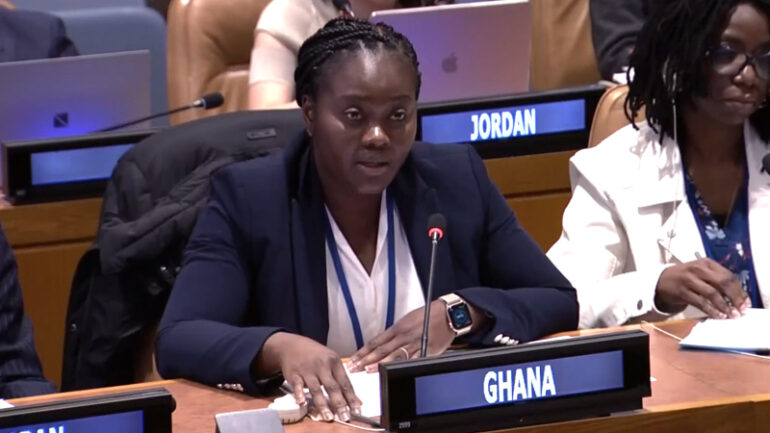UNSC Arria-Formula meeting politicization of Prohibition of Chemical Weapons

- Posted by admin
- Posted in Statement & Remarks
Linda Kesse Antwi (Mrs)
Counsellor
New York, New York
March 24, 2023
Risks Stemming from the Politicization of the Activities of the Organization for the Prohibition of Chemical Weapons
Let me begin by thanking the Russian Federation for convening this Arria-formula meeting and the briefers for their insightful perspectives on the subject. We have taken due and careful note of the briefings.
Mr. Chair,
Despite the important advances in chemistry for the benefit of mankind, the emerging developments in the area, and dual-use nature of some chemicals, presents perpetual risks to disarmament and non-proliferation.
As a State party to the Chemical Weapons Convention, Ghana acknowledges the Convention as a key framework for preventing proliferation and promoting disarmament, while ensuring the peaceful uses of chemistry through the prohibition of the development, production, acquisition, stockpiling, retention, transfer or use of chemical weapons by States Parties. A product of several years of diplomatic negotiations and advocacy work, the CWC is the first arms-control treaty to introduce a verifiable ban on an entire class of weapons of mass destruction.
We reaffirm our support for the mandate of the three main bodies of the Organisation for the Prohibition of Chemical Weapons (OPCW) that oversee the implementation of the Chemical Weapons Convention. We continue to uphold that that the Executive Council, the Technical Secretariat, and the Conference of the States Parties, which is the highest decision-making body of the organization, should be guided by Article VIII, paragraph 44, of the Chemical Weapons Convention, which states that due regard should be given to equitable geographical representation.
Mr. Chair,
In furtherance of the mandate of the Convention since its founding, the OPCW has made significant progress in global stockpile destruction. About 71,946 metric tonnes of stockpiles of chemical agents, representing 99% of the72,304 metric tonnes declared chemical agents stockpiles have been destroyed under OPCW verification.
After years of cooperation, the OPCW’s Technical Secretariat confirmed the successful destruction of four former chemical weapons production facilities in Iraq, with a former Iraqi chemical weapons production facility remaining subject to inspection until 2028. The OPCW is also currently involved in engagements with the US towards its target date of September 2023 for the complete destruction of its remaining chemical weapons stocks, as well as a trilateral cooperation between itself, China, and Japan to destroy chemical weapons abandoned during WWII, among others. Indeed, the OPCW’s past and current programs have involved many States including the Syrian Arab Republic, Iran, Iraq, Japan and China as well as Russia.
Concerning OPCW’s ongoing efforts to clarify outstanding issues related to Syria’s declarations, Ghana wishes to underscore the need for a definite closure of the matter, in order to avoid lingering doubts over the production and possible use of chemical weapons in Syria. We therefore urge all stakeholders to show full commitment to resolve all outstanding issues.
Mr. Chair,
All in all, Ghana believes that the OPCW has proven to be an efficient instrument in the procedures relating to the verification of and destruction of declared chemical weapons stockpiles and related substances. While we note some challenges, including the fact that universalization is yet to be achieved and the fact that the OPCW still has more work to do in finding a balance between prevention and promotion in relation to chemical applications with malevolent and beneficial uses, the 2013 award of the Nobel Peace Prize to the OPCW demonstrates the valiant efforts it has made in eliminating chemical weapons.
We therefore believe, as a State party, that all efforts should continue to be made to professionalise this technical body whose structures and mode of operation are clearly defined by the Convention. We believe that except, in specific cases that the UN General Assembly has to consider its annual report and the Security Council has to address specific reports intended for its attention, it would be inappropriate to engage in processes that are not envisioned by the Convention and in forums that are not driven by the State parties who alone have a right to reinterpret the organisation’s mandate.
In conclusion, we reiterate our longstanding position against the use of chemical weapons by anyone, anywhere and under any circumstances. We also reaffirm our commitment to international efforts aimed at preventing the use of Chemical weapons and support all efforts to rid their production, storage or use.
I thank you for your attention
